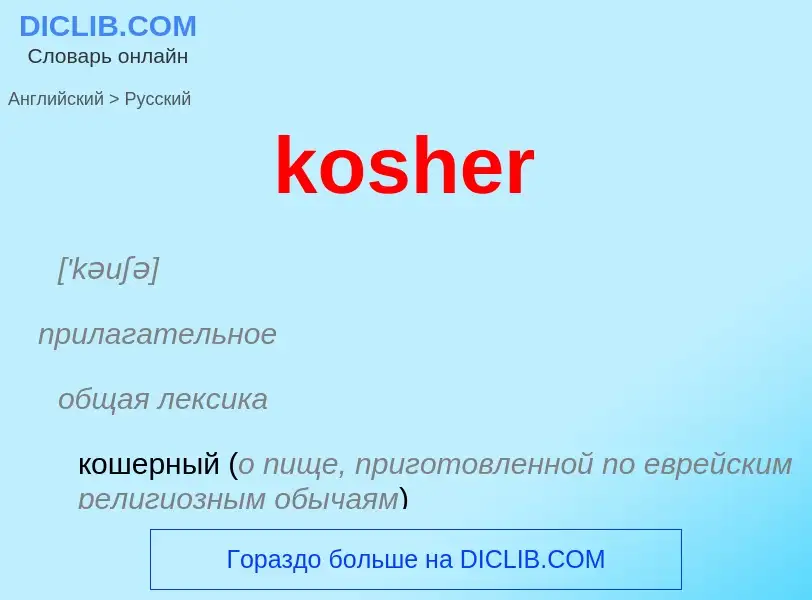ترجمة وتحليل الكلمات عن طريق الذكاء الاصطناعي ChatGPT
في هذه الصفحة يمكنك الحصول على تحليل مفصل لكلمة أو عبارة باستخدام أفضل تقنيات الذكاء الاصطناعي المتوفرة اليوم:
- كيف يتم استخدام الكلمة في اللغة
- تردد الكلمة
- ما إذا كانت الكلمة تستخدم في كثير من الأحيان في اللغة المنطوقة أو المكتوبة
- خيارات الترجمة إلى الروسية أو الإسبانية، على التوالي
- أمثلة على استخدام الكلمة (عدة عبارات مع الترجمة)
- أصل الكلمة
kosher - ترجمة إلى الروسية
['kəuʃə]
прилагательное
общая лексика
кошерный (о пище, приготовленной по еврейским религиозным обычаям)
кошерный, разрешенный законами иудаизма
сленг
правильный
разрешённый
настоящий
законный
честный
существительное
['kəuʃə]
общая лексика
кошер (пища, приготовленная по еврейским религиозным обычаям)
лавка
где продаются кошерные продукты
تعريف
ويكيبيديا
Kashrut (also kashruth or kashrus, כַּשְׁרוּת) is a set of dietary laws dealing with the foods that Jewish people are permitted to eat and how those foods must be prepared according to Jewish law. Food that may be consumed is deemed kosher ( in English, Yiddish: כּשר), from the Ashkenazic pronunciation (KUHsher) of the Hebrew kashér (כָּשֵׁר), meaning "fit" (in this context: "fit for consumption").
Although the details of the laws of kashrut are numerous and complex, they rest on a few basic principles:
- Only certain types of mammals, birds and fish meeting specific criteria are kosher; the consumption of the flesh of any animals that do not meet these criteria, such as pork, frogs, and shellfish, is forbidden.
- Kosher mammals and birds must be slaughtered according to a process known as shechita; blood may never be consumed and must be removed from meat by a process of salting and soaking in water for the meat to be permissible for use.
- Meat and meat derivatives may never be mixed with milk and milk derivatives: separate equipment for the storage and preparation of meat-based and dairy-based foods must be used.
Every food that is considered kosher is also categorized as follows:
- "Meat" products (also called b'sari or fleishig) are those that contain kosher meat, such as beef, lamb or venison, kosher poultry such as chicken, goose, duck or turkey, or derivatives of meat, such as animal gelatin; non-animal products that were processed on equipment used for meat or meat-derived products must also be considered as meat (b'chezkat basar)
- "Dairy" products (also called c'halavi or milchig) contain milk or any derivatives such as butter or cheese; non-dairy products that were processed on equipment used for milk or milk-derived products must also be considered as milk (b'chezkat chalav)
- Pareve products contain neither meat, milk nor their respective derivatives; they include foods such as fish, eggs from permitted birds, grains, produce and other edible vegetation. They remain pareve if they are not mixed with or processed using equipment that is used for any meat or dairy products.
While any produce that grows from the earth, such as fruits, grains, vegetables and mushrooms, is always permissible, laws regarding the status of certain agricultural produce, especially that grown in the Land of Israel, such as tithes and produce of the Sabbatical year, impact their permissibility for consumption.
Most of the basic laws of kashrut are derived from the Torah's books of Leviticus and Deuteronomy. Their details and practical application, however, are set down in the Oral Torah (eventually codified in the Mishnah and Talmud) and elaborated on in the later rabbinical literature. Although the Torah does not state the rationale for most kashrut laws, some suggest that they are only tests of obedience, while others have suggested philosophical, practical and hygienic reasons.
Over the past century, many kashrut certification agencies have started to certify products, manufacturers, and restaurants as kosher, usually authorizing the use of a proprietary symbol or certificate, called a hechsher, to be displayed by the food establishment or on the product, which indicates that they are in compliance with the kosher laws. This labeling is useful for many people, including those whose religions expect adherence to a similar set of dietary laws, people with allergies to dairy foods, or vegans, who use the various kosher designations to determine whether a food contains meat or dairy-derived ingredients.
The laws of Kashrut are a major area covered in traditional Rabbinic Ordination; see Yeshiva § Jewish law and Semikhah § Varieties of ordination. And numerous scholarly and popular works exist on these topics, covering both practice and theory.

![nut]]s and [[vegetable]]s need to be checked to avoid eating insects. nut]]s and [[vegetable]]s need to be checked to avoid eating insects.](https://commons.wikimedia.org/wiki/Special:FilePath/Barley bug.jpg?width=200)
![Cloven hooves]] in goats (upper left), pigs (lower left), and [[cattle]] (lower right). Horse hooves (upper right) are not cloven. Cloven hooves]] in goats (upper left), pigs (lower left), and [[cattle]] (lower right). Horse hooves (upper right) are not cloven.](https://commons.wikimedia.org/wiki/Special:FilePath/Hoof montage.jpg?width=200)
![Kosher [[airline meal]] approved by [[The Johannesburg Beth Din]] Kosher [[airline meal]] approved by [[The Johannesburg Beth Din]]](https://commons.wikimedia.org/wiki/Special:FilePath/Kosher BethDin.jpg?width=200)
![Kosher [[McDonald's]] in [[Buenos Aires]], [[Argentina]] Kosher [[McDonald's]] in [[Buenos Aires]], [[Argentina]]](https://commons.wikimedia.org/wiki/Special:FilePath/Kosher McDonald's, Abasto Shopping, Buenos Aires.jpg?width=200)
![Kosher labels on salt and sugar packages in [[Colombia]]. Kosher labels on salt and sugar packages in [[Colombia]].](https://commons.wikimedia.org/wiki/Special:FilePath/Kosher labels.jpg?width=200)
![[[OK Kosher Certification]] (circled K) symbol with a dairy designation on a bag of [[chocolate chip]]s [[OK Kosher Certification]] (circled K) symbol with a dairy designation on a bag of [[chocolate chip]]s](https://commons.wikimedia.org/wiki/Special:FilePath/OK kosher D symbol.jpg?width=200)
![[[shechita]]}} [[shechita]]}}](https://commons.wikimedia.org/wiki/Special:FilePath/Schect.jpg?width=200)
![Kosher shop in [[Warsaw]], using the Polish spelling of "kosher" Kosher shop in [[Warsaw]], using the Polish spelling of "kosher"](https://commons.wikimedia.org/wiki/Special:FilePath/Sklep koszerny.jpg?width=200)

